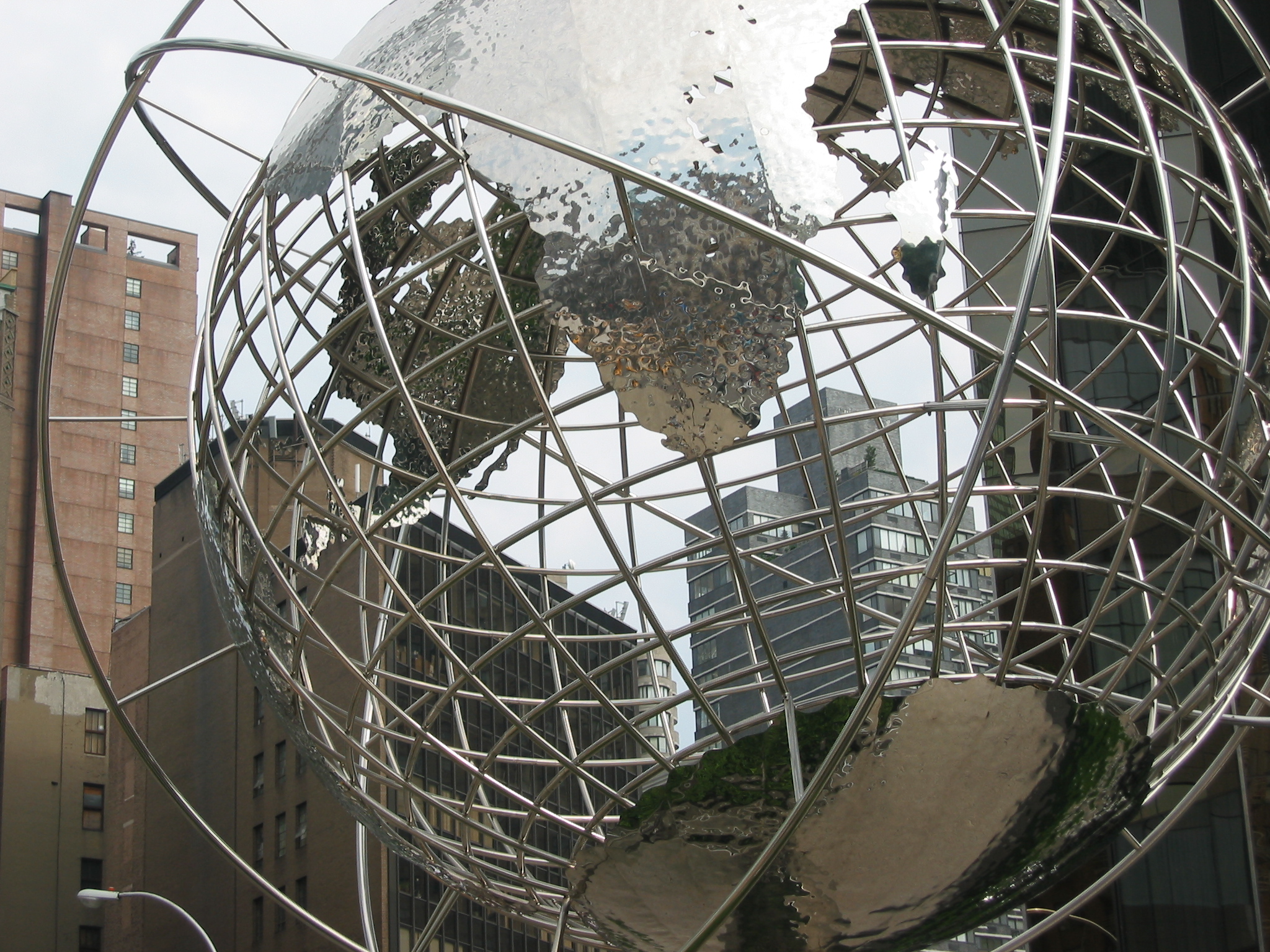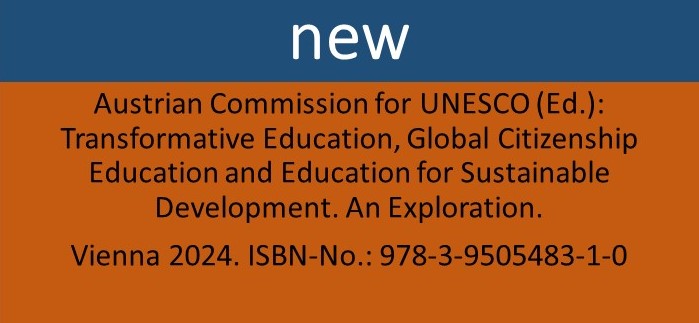Global and Planetary
Citizenship
Global Citizenship Education (GCED) has been an internationally recognized field of educational research and practice for many years. With the adoption and central positioning of the term by the UNO and UNESCO, the debates on this have experienced a further upswing. While GCED has long been a topic of discussion in the English-speaking world, the concept has only been around in German-speaking countries since the Ban Ki-moons initiative in 2013 (http://www.globaleducationfirst.org/289.htm) and especially since the adoption of the Sustainable Development Goals 2015 (https://sustainabledevelopment.un.org/content/documents/21252030%20Agenda%20for%20Sustainable%20Development%20web.pdf) received wide attention.
Global citizenship is an expression of the fact that the entire planet as the action space of one world domestic politics that is, a sphere of political action in which everyone's right to exist as individuals and political subjects is recognized and the inevitable conflicts between groups of people, social classes, and states are fought out in a civilized manner. In order to help this way of thinking to break through, a variety of efforts are necessary, including in the area of education and training: That is the idea of Global Citizenship Education.
The term was for a long time Global Learning/Global Education predominant and was also used by me. Now is Global Citizenship Education in the process of stepping alongside global learning. (Cf. e.g. the Dublin Declaration from 2022, https://www.unesco.at/bildung/artikel/article/bildung-fuer-die-herausforderungen-der-heutigen-welt-die-dublin-declaration). The focus on citizenship refers more strongly to the political dimension of the term. Global citizenship education could thus become an “umbrella term” that also includes traditional political education. I myself prefer the double term Global and Planetary Citizenship Education, because this expresses the reference to human society (global) and to nature (planetary).
In Austria, this topic is mainly dealt with by the following institutions:
Comment (Society for Communication, Development and Dialogical Education);
UNESCO Chair Global Citizenship Education at the Alpen-Adria Universität Klagenfurt;
Ban Ki-moon Center for Global Citizens.
Global Learning and Global Citizenship Education in other pedagogical fields
In the context of German didactics, overcoming a national perspective has always been an important concern for me, which is why I have advocated transcultural German didactics (cf. the publications poetics of diversity and Transcultural literature didactics). This implied dealing with world literature, multilingualism and political issues such as flight and migration (cf. the special issue Global citizenship education in German lessons the magazine ideal). The current trend towards an anti-racist and post-colonial orientation is very much in line with efforts to integrate GCED into German didactics.
At the same time, in agreement with the work of the American peace educator Betty A. Reardon, I have always understood peace education as a task of global learning. This topic is also part of my book pedagogy of the other (1999) devoted a large chapter to Gradually, however, Global Citizenship Education has emerged as an independent field of work. This step was finally taken with the establishment of the university course Global Citizenship Education (2012).
The university course GCED
In 2012, the three-year university course (ULG) with a Master's degree in Global Citizenship Education (GCED) was founded by the Center for Peace Research and Peace Education at the Alpen-Adria-Universität Klagenfurt and KommEnt/Contact Center for Global Learning and Global Citizenship Education in cooperation with the Carinthian University of Education. It is financially supported by the Federal Ministry of Education, Science and Research (BMBWF) and the Austrian Development Agency (ADA).
From the winter semester 2019/2020 it will be offered for the third time and with an extended curriculum, higher number of ECTS and under the direction of the UNESCO Chairholder Hans Karl Peterlini (https://www.aau.at/universitaetslehrgaenge/global-citizenship-education/). https://www.facebook.com/austriandevelopmentagency/videos/262980111250101
The course is aimed at teacher trainers, teachers and other multipliers and contributes to the formation of a network. It was awarded the "Sustainability Award" of the BM for Sustainability and Tourism and the BM for Education, Science and Research and with the GENE Award "Quality and good practice in Global Education across Europe". The course gave and continues to give many impulses to strengthen the idea of global citizenship in many directions.
Global Learning Strategy Group
The Global Learning Strategy Group came together in 2003 to implement the results of an international Council of Europe Congress on Global Learning in Maastricht, Austria. This is done through regular meetings of the working group, which is made up of science, NGOs and representatives of ministries; through the elaboration of a strategy paper (2009, updated 2019) and through annual federal conferences "Global Learning – Potential & Perspectives” (since 2012). https://www.komment.at/bildung-dialog/bundesfachtagung-globales-lernen/
Cooperation with UNESCO
In cooperation with the Austrian UNESCO school network, the ULG management team not only trained teachers, but also developed new teaching materials on GCED and documented exemplary school projects.
The management team is also represented on the advisory board “Transformative Education/Global Citizenship Education” (since 2017) (https://www.unesco.at/bildung/bildung-2030/fachbeirat-transformative-bildung/). There it is on Position paper on the implementation of SDG 4 in Austria (2019) Contributed (https://www.unesco.at/bildung/artikel/article/bildung-in-oesterreich-positionspapier-des-oeuk-fachbeirats-zum-sdg4) as well as at the biennial global UNESCO Forums on GCED took part.
Campaign Homeland Earth
The campaign Heimatland Erde (see field of work peace research) had an educational dimension and was part of my work in the field of GCED.
https://www.aspr.ac.at/bildung-training/aspr-kampagnen/heimatland-erde#/
publications
BOOKS
Werner Wintersteiner / Sabine Zelger (Hg.): Global Citizenship Education im Deutschunterricht. Informationen zur deutschdidaktik, Heft 4/2021. ISSN 0721-9954.
::::::::::::::::::::::::::::
ESSAYS
'Education for Homeland Earth'. Framework to Mainstream Global Citizenship Education – The Austrian Experience. In: .ed magazine. “Mainstreaming and Advancing Global Citizenship Education”. Vol. 3, February 2022, https://www.globalcitizenshipfoundation.org/article/education-for-homeland-earth-framework-to-mainstream-global-citizenship-education-the-austrian-experience.
Diederichs, Michelle/Wintersteiner, Werner (2022): Global Citizenship Education – A Local Topic? In: URBANET. https://www.urbanet.info/global-citizenship-education-a-local-topic/
Critical-dialogical cosmopolitanism. Foundation of a postcolonial oriented global citizenship education. In: Phillip D. Th. Knobloch/Johannes Drerup (eds.): Education in postcolonial constellations. Educational analyzes and pedagogical perspectives. Bielefeld: transcript 2022, 23-45. ISBN 978-3-8376-5669-5.
Global Citizenship Education. In: Wolfgang Beutel, Markus Gloe, Gerhard Himmelmann, Dirk Lange, Volker Reinhardt, Anne Seifert (eds.): Handbuch Demokratiepädagogik. Frankfurt: Debus/Wochenschau Verlag 2022, 347-360. ISBN 978-3-95414-185-2.
German lessons as Global Citizenship Education. A suggestion to think along and think ahead. In: information on German didactics, vol. 45, issue 4, 2021, 10-21. ISSN
BOOKS AND BROCHURES
Werner Wintersteiner and Heidi Grobbauer. With the collaboration of Margot Kapfer and Judith Waizenegger: University course Global Citizenship Education. Basics, experiences, insights. Salzburg, Klagenfurt: 2019. ISBN 978-3-9504408-6-7.
Heidi Grobbauer/Werner Wintersteiner, in collaboration with Margot Kapfer: Global Citizenship Education. Concepts, Efforts, Perspectives – an Austrian experience. Salzburg, Klagenfurt: 2019. ISBN 978-3-9504408-5-0.
Heidi Grobbauer, Werner Wintersteiner, with the collaboration of Susanne Reitmair-Juárez (ed.): Global Citizenship Education in Practice: Experiences, Successes, Examples in Austrian Schools. Vienna: Austrian UNESCO Commission 2018. ISBN 978-3-200-06103-3. https://www.unesco.at/fileadmin/Redaktion/Publikationen/Publikations-Dokumente/2018_GCED_in_der_Praxis.pdf
Werner Wintersteiner/Heidi Grobbauer/Gertraud Diendorfer/Susanne Reitmair-Juárez: Global Citizenship Education: Citizenship Education for Globalizing Societies. Klagenfurt, Salzburg, Vienna 2015. ISBN 978-3-902379-02-3. Downloads:
Werner Wintersteiner/Heidi Grobbauer/Gertraud Diendorfer/Susanne Reitmair-Juárez: Global Citizenship Education: Political Education for World Society. Vienna: UNESCO 2014. ISBN 978-3-902379-02-3. Downloads: https://www.unesco.at/fileadmin/Redaktion/Publikationen/Publikations-Dokumente/2014_GCED_Politische_Bildung_fuer_die_Weltgesellschaft.pdf
Hajnalka Nagy, Werner Wintersteiner, Heidi Grobbauer (eds.): Reading out into the world. world literature in the classroom. Global Learning Practice, Issue 1, Salzburg 2014. ISBN 978-3-9503620-5-3. Downloads: file:///C:/Users/Anwender/Downloads/6092329.pdf
ESSAYS
“Peace Education for Global Citizenship”. The Genuine Global Dimension of Betty Reardon's Concept of Peace Education. In: Dale T. Snauwaert (ed.): Exploring Betty A. Reardon's Perspective on Peace Education. Looking back, looking forward. Cham: Springer 2019, 15-28 ISBN 978-3-030-18386-8.
Global Citizenship Education – A Pedagogical Response to the 'Great Regression'? In: Journal for International Educational Research and Development Pedagogy, Volume 42 2019, Issue 1, 21-25. Waxmann 2019. doi.org/10.31244/zep.2019.01.05
Global Citizenship Education - Learning for the world society. In: oead'news No. 107/2018, 10-12.
Werner Wintersteiner/Christoph Wulf: Global Citizenship - Convivial Cosmopolitanism. In: Roland Bernecker/Ronald Grätz (eds.): Global Citizenship. Perspectives of a World Community. Goettingen: Steidl 2018, 32-41. ISBN 978-3-95829-487-5.
Citizens of "Homeland Earth". UNESCO on the Road to “Global Citizenship Education”: The Refugee Example. In: Helmut Kury, Sławomir Redo (Editors): Refugees and Migrants in Law and Policy. Challenges and Opportunities for Global Civic Education. Cham: Knight. 2018, 835-862. ISBN 978-3-319-72158-3.
Political education with a global horizon. In: Parliamentary NorthSouth Dialogue Newsletter No. 43 / December 2017, pp. 2-4.
The realistic utopia of open borders. The global citizenship perspective to overcome 'methodological nationalism'. In: Bettina Gruber/Viktorija Ratković (eds.): Migration. Education. Peace. Perspectives for living together in post-migrant society, Münster: Waxmann 2017, 163-178. ISBN 978-3-8309-3724-1.
Werner Wintersteiner/Christoph Wulf (2017): Global Citizenship – convivialist cosmopolitanism. In: Roland Bernecker/Ronald Grätz (eds.): Global Citizenship. Perspectives of a world community. Goettingen: Steidl, 34-43. ISBN 978-3-95829-211-6.
L'education a la citoyenneté mondiale: a program de l'education a la paix. In : Obrillant Damus/Christoph Wulf/Joseph P. Saint-Fleur/Denis Jeffrey (sous la direction de): Pour une éducation à la paix dans un monde violent. Paris: L'Harmattan 2017, 117-143. ISBN 9782343134505.
Heidi Grobbauer/Werner Wintersteiner: Global citizenship as an educational strategy. Experiences with the university course "Global Citizenship Education". In: Education and Training, 69th year, issue 3/September 2016, pp. 325-340. ISBN 978-3-412-50587-5, ISSN0006-2456.
Global Citizenship Education – a peace education concept. In: Helmolt Rademacher, Werner Wintersteiner (eds.): Yearbook Democracy Education 2016: Peace Education and Democracy Education. Schwalbach/Ts.: Wochenschau Verlag 2016, 44-59. ISBN 9783734402777.
Global Citizenship – the art of living together in global society. In: Massimiliano Boschi/Adel Jabbar/Hans Karl Peterlini (ed.): Beyond Cain and Abel. Ten points for living together - reread and commented on. In memory of Alexander Langer 1995 – 2015. Meran/Klagenfurt-Celovec: alphabeta and Drava 2015, 179-189. ISBN 978-3-85435-774-2 and ISBN 978-88-7223-235-4.
Global Citizenship – L'arte della convivenza nella società mondiale. In: Massimiliano Boschi/Adel Jabbar/Hans Karl Peterlini (eds.): Oltre Caino e Abele. Il Decalogo per la convivenza riletto e commentato. In memory of Alexander Langer 1995-2015. Meran/Klagenfurt-Celovec: alphabeta and Drava 2015, 175-185. ISBN 978-88-7223-251-4.
Building a global community for a culture of peace: the Hague appeal for peace global campaign for peace education (1999-2006). In: Journal of Peace Education, vol. 10, no. 2/2013, 138-156. ISSN 1740-0201.
Global Citizenship Education: Education for world citizens. In: ACTION & REFLECTION. Texts on transdisciplinary development research and dialogical education, issue 10 (2013), 18-29. ISBN 978-3-9503620-2-2. Downloads: https://bildung2030.at/wp-content/uploads/2020/03/AR10_TaGL12_WEB.pdf
From peace work to global citizenship: Werner Wintersteiner on the peace education approach to global learning. In: Helmuth Hartmeyer: From Rosen and Thujen: Find out about global learning. Munster: Waxmann 2012, 42-46. ISBN : 978-3830928096.
ESSAYS
Holistic, global, society-changing. Twelve theses on peace education. In: Gruber/ Wintersteiner/ Duller (eds.) Peace Education as a Prevention of Violence. Regional and international experiences. Klagenfurt: Drava 2009 (= Klagenfurt Contributions to Peace Research, Vol. 2), 14-31. ISBN 978-3-85435-550-2.

